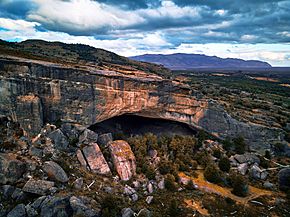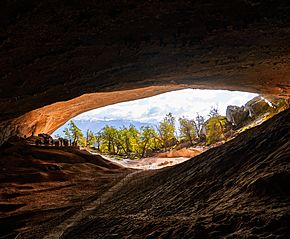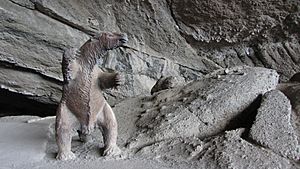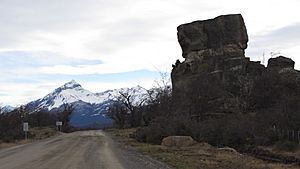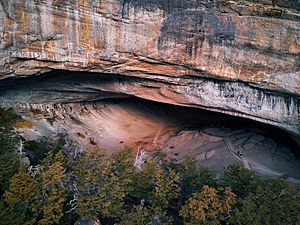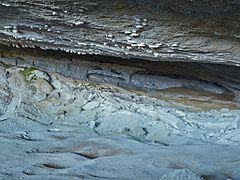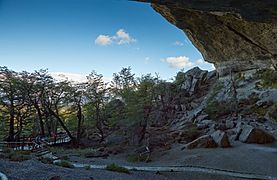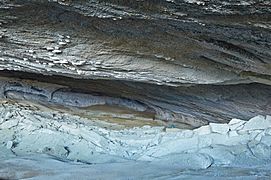Cueva del Milodón Natural Monument facts for kids
Quick facts for kids Cueva del Milodón Natural Monument |
|
|---|---|
|
IUCN Category III (Natural Monument)
|
|
|
Mylodon's Cave
|
|
| Location | Magallanes Region, Chile |
| Governing body | Corporación Nacional Forestal |
The Cueva del Milodón Natural Monument is a special protected area in Chilean Patagonia. It's about 24 kilometers (15 miles) northwest of Puerto Natales. This monument is famous for its amazing caves and a unique rock formation.
The monument is located near Cerro Benitez. It includes several caves and a rock shape called Silla del Diablo (which means Devil's Chair). The most famous cave here is named after the Mylodon. This was a giant ground sloth. In 1895, scientists found skin and bones of this extinct animal inside the cave. The monument is also part of the "End of the World Route," a beautiful tourist path.
Contents
The Famous Milodón Cave
The biggest cave in this monument is the Milodón Cave. It is about 200 meters (656 feet) long. A German explorer named Hermann Eberhard found it in 1895. He discovered a large piece of skin that looked very fresh. He didn't know what animal it came from.
In 1896, another explorer, Otto Nordenskjöld, explored the cave. Later, it was confirmed that the skin belonged to a Mylodon. This huge animal lived a very long time ago, between 10,200 and 13,560 years ago.
Inside the Milodón Cave and other nearby caves, scientists have found remains of many other extinct animals. They have also found signs that humans lived here a long time ago.
At the entrance of the monument, there is a life-size model of the prehistoric Mylodon. This animal was a very large plant-eater, a bit like a huge bear. It died out at the end of the Pleistocene Epoch, which was a period of Earth's history with ice ages.
Ancient Animals of the Caves
Studies have shown that the Mylodon lived until about 5,000 years ago. Scientists also found proof of other ancient animals in these caves. These include the "Dwarf Horse" called Hippidion. There was also the fearsome saber-toothed cat Smilodon. Another interesting animal found was the Macrauchenia, which was a type of hoofed mammal.
Early Human Life Here
Many signs of human life have been found at Cueva del Milodón. These include rocks broken by fire, stone tools, and even human remains. It shows that people lived in this area as early as 6000 BC (Before Christ).
Panorama
See also
 In Spanish: Monumento natural Cueva del Milodón para niños
In Spanish: Monumento natural Cueva del Milodón para niños
- Cerro Toro
- Eberhard Fjord
- Martin Gusinde Anthropological Museum
- Hippidion saldiasi
 | John T. Biggers |
 | Thomas Blackshear |
 | Mark Bradford |
 | Beverly Buchanan |


